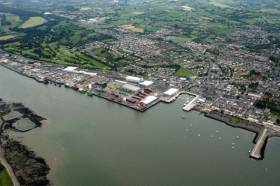Displaying items by tag: British Ports Association
First of the UK's 'Freeports' Launched in Major Economic Boost
The first ports in the United Kingdom to be designated 'freeports' are Plymouth, the Solent and Teesside which are now fully up and running after receiving final government approval.
The Freeports which the British government approved recently have become fully operational. This marks a major milestone in the government’s mission to level up communities across the UK and will help spread opportunity and drive economic growth.
Each of these Freeports will now receive up to £25 million in seed funding and potentially tens of millions of pounds in locally retained business rates to upgrade local infrastructure and stimulate regeneration.
Businesses in Freeports can take advantage of tax incentives, unlocking much-needed investment and bringing high quality jobs in industries of the future to some of the nation’s most overlooked communities.
Combined, the first three Freeports are expected to bring millions of pounds in investment and thousands of highly skilled jobs, turbocharging local economies and benefitting the whole of the UK.
Levelling Up Minister Dehenna Davison said: We are taking full advantage of the freedoms of leaving the EU and these Freeports in Teesside, Plymouth and South Devon and Solent will attract new business to often overlooked areas, creating thousands of jobs.
Now they are up and running, these Freeports will harness local expertise to grow vital industries and turbocharge our national economy.
Freeports will generate prosperity and spread opportunity throughout the UK by driving innovation and throwing open our doors to trade with the world.
The Department for Levelling Up, Housing and Communities has given the final greenlight for the Freeports which are set to receive up to £25 million each to drive local plans.
This means:
- Plymouth and South Devon will harness the region’s marine and defence expertise to deliver thousands of skilled jobs injecting millions of pounds of investment into the region.
- Solent will grow its ambitious maritime economy, making the Solent a thriving hub for the world’s marine and maritime sector.
- Teesside can continue to drive investment and industrial growth in renewables, advanced manufacturing and the chemicals and process sectors, creating more than 18,000 highly skilled jobs in the northeast.
Ben Murray, Maritime UK Chief Executive, said: The freeport programme is catalysing economic growth and job creation in coastal towns and cities around the UK.
We’re delighted to see the first three officially launched with ambitious plans to develop their local proposition for inward investment, innovation, and exports.
From marine autonomy to defence, advanced manufacturing to decarbonisation, these freeports will help strengthen our maritime clusters and grow our maritime sector; already one of Britain’s biggest industries. We look forward to continuing to work with government to harness the potential of maritime to accelerate levelling-up.
Richard Ballantyne OBE, Chief Executive, British Ports Association said: Congratulations to the Plymouth, Solent and Tees Freeports as there has been a lot of hard work to get to this stage. We welcome the next chapter of this key economic policy and want to see Freeports work for their regions as well as the whole of the UK.
We believe strongly that the business benefits Freeport areas include will be pivotal in attracting new investment and jobs to our important coastal regions. This is an exciting time to be involved in the ports sector and we are pleased that policy makers see our industry as a focal point for levelling up.
Freeports benefit from a package of measures, comprising tax reliefs, customs advantages, business rates retention, planning, regeneration, innovation and trade and investment support.
We expect the remaining five English Freeports to join Plymouth, Solent, and Teesside in receiving final approvals shortly, and we remain committed to ensuring all four corners of the UK can reap the benefits of our Freeports programme.
Brexit Ports: British Ports Association Call for Special Zones
#BrexitPorts - The British Ports Association (BPA) in response to potential administrative complications that could arise from Brexit, is calling for the UK government to classify port areas and surrounding clusters as ‘special port zones’.
As Container Management writes, BPA chairman Rodney Lunn and director Richard Ballantyne met with John Hayes, the minister of state at the Department of Transport to address concerns that Brexit could bring increased frontier and customs activities at ports.
There are concerns that these added processes could discuss cargo and logistics flows, making UK ports less competitive and adding costs to the freight industry, noted a statement from the BPA.
To tackle these issues, Ballantyne stated: “We envisage a system whereby port areas and surrounding clusters might be classified as ‘special port zones’ with fast tracked planning and licensing systems.
“Such zones could safeguard against restrictive environmental designations, which can often limit port growth and development,” he added.
Ballantyne also highlighted his wish that government activity at UK borders do not disrupt freight and passenger gateways.
In any case, the specific conditions of Britain’s post-Brexit trading relationship with the European Union (EU) will only become known following the UK government’s triggering of Article 50 of the Lisbon Treaty and a subsequent negotiation.
























































